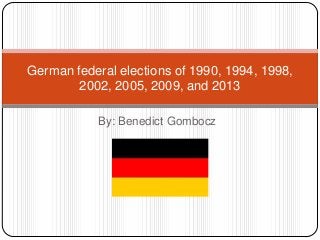
German federal elections of 1990, 1994, 1998, 2002, 2005, 2009, and 2013
- 1. By: Benedict Gombocz German federal elections of 1990, 1994, 1998, 2002, 2005, 2009, and 2013
- 2. German federal election, 1990 12th German federal election; conducted 2 December 1990 to elect members to the German parliament (Bundestag) of the Federal Republic of Germany First free German election since federal election of 1933 that granted Adolf Hitler powers to make him dictator First election conducted after Germany’s reunification in October; a big number of seats were added to represent the five states of the former German Democratic Republic (East Germany) that were re-established without decreasing number of Western numbers Euphoria following reunification gave governing CDU/CSU-FDP coalition a striking advantage in both the west and east of Germany during the entire campaign Chancellor before election was Helmut Kohl of CDU/CSU; elected Chancellor was Helmut Kohl of CDU/CSU, who, with his victory, started what would be the second eight years of being German Chancellor (he was Chancellor of West Germany only in what was the first eight years)
- 3. German federal election, 1994 13th German federal election; conducted 16 October 1994 to elect members to the parliament (Bundestag) of the Federal Republic of Germany Social Democratic Party of Germany (SPD) permitted its members to elect candidate to run for Chancellor against Helmut Kohl of CDU/CSU First candidate out of three (the latter two were Gerhard Schröder and Heidemarie Wieczorek- Zeul) was Rudolf Scharping, Minister-President of Rhineland-Palatinate Tensions between Scharping and Oskar Lafontaine and Gerhard Schröder hindered his campaign For the first time, the Alliance ‘90/The Greens (Bündnis 90/Die Grünen) seemed to be willing to participate in a government in the event that an SPD-Greens coalition would have majority Chancellor before election was Helmut Kohl of CDU/CSU; elected Chancellor was Helmut Kohl of CDU/CSU
- 4. German federal election, 1998 Conducted 27 September 1998 to elect members to the 14th Bundestag Centered on economic and domestic issues the unified Germany had to battle even as it actively took part in project of European integration Most voters blamed centre-coalition government of Christian Democratic Union of Germany (CDU) and Christian Social Union in Bavaria (CSU) and liberal Free Democratic Party (FDP) for economic problems Campaign of 1998 began with both CDU and SPD questioning who would lead their parties in the election Chancellor before election was Helmut Kohl of CDU/CSU; elected Chancellor was Gerhard Schröder of SPD, ending Helmut Kohl’s government that had been in power since 1982
- 5. German federal election, 2002 15th German federal election; conducted 22 September 2002 Campaign of 2002 was dominated by several issues, with opposition CDU/CSU attacking incumbent Chancellor Gerhard Schröder’s government’s performance on the German economy and with campaigning on family values issues and in opposition to taxes (especially on fuel) The government of the ruling SPD, on the other hand, was aided by broad support for its opposition to the George W. Bush administration’s vote to invade Iraq and Gerhard Schröder’s personal popularity in relation to opponent Edmund Stoiber of CDU/CSU Chancellor before election was Gerhard Schröder of SPD; elected Chancellor was Gerhard Schröder of SPD Second election (the first being 1994) in which a government had been re-elected
- 6. German federal election, 2005 Took place 18 September 2005 to elect members of 16th German Bundestag; became necessary after motion of no confidence in incumbent Chancellor Gerhard Schröder failed to pass on 1 July Opposition CDU and CSU (its sister party represented only in Bavaria, or Bayern) began federal election campaign with 21% lead over rival and governing SPD in opinion polls Several commentators believed the Christian Democrats would win clear electoral victory and Angela Merkel, leader of CDU, would become Chancellor, forming government coalition with Free Democratic Party (FDP) and replace ruling SPD-Greens coalition Chancellor before election was Gerhard Schröder of SPD; elected Chancellor was Angela Merkel of CDU/CSU, who thus was the first woman to be elected German Chancellor
- 7. German federal election, 2009 Took place 27 September 2009 to elect members of 17th Bundestag Prepatory results showed favor to governing CDU, CSU, and FDP; the three parties, which had formed a coalition after victory in previous election, declared they would form new centre- right government Their principal opponent, Frank-Walter Steinmeir of SPD, acknowledged defeat Christian Democrats previously ruled in coalition with FDP in most of the governments of West German Chancellors Konrad Adenauer, Ludwig Erhard, and Helmut Kohl (1949-1966 and 1982- 1998, respectively) Chancellor before election was Angela Merkel of CDU/CSU; elected Chancellor was Angela Merkel of CDU/CSU Third election (the first two being 1994 and 2002) that re-elected incumbent government
- 8. German federal election, 2013 Currently ongoing (22 September 2013), and will decide the 630 members of 18th Bundestag, Germany’s major federal legislative house Christian Democratic Union/Christian Social Union (CDU/CSU) alliance of Chancellor Angela Merkel won with their best result since 1990, with about 42% of the vote and about 50% of the seats Conversely, CDU/CSU alliance’s coalition partner, Free Democrats (FDP), lost their seats in Bundestag Merkel will have to turn to opposition Social Democrats (SPD) for grand coalition, or to the Greens to create majority government
